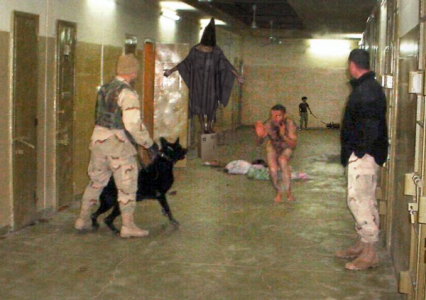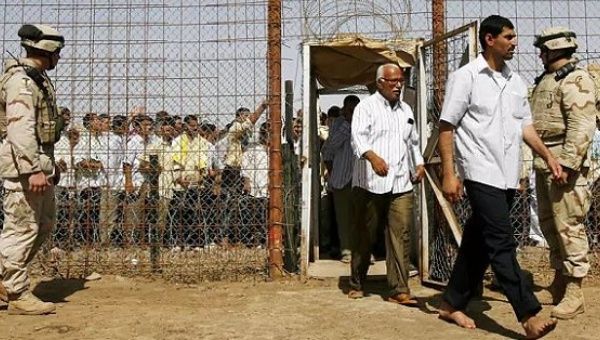
Abu Ghraib prison was located in the town of Abu Ghraib, 32 kilometers away from Baghdad in Iraq. Around 7500 prisoners were kept in Abu Ghraib at a time, with cell blocks 1a and 1b primarily used for torture. Torture methods would often include sleep deprivation, slapping, and waterboarding, a process in which the victim experiences the sensation of drowning only to be saved at the last second. Eric Fair, a former Abu Ghraib interrogator, echoed the same ideas when, in an interview with NPR, admitted to using "stress positions" where prisoners were physically strained until "you essentially achieved muscle failure". Torture, both then and now, is internationally illegal, so the process was both morally and legally questionable. However, this did not stop many members of the Bush administration, most notable Bush himself, from backing the use of torture.
 The first outside recognition of the events at Abu Ghraib came in the form of the release of the Torture Memos. These documents, approved by the U.S government, allowed for many forms of torture and set the bar shockingly low for what was allowed. It essentially only banned anything that resulted in organ failure or death. The Bush administration came under much scrutiny for this from international as well as domestic organizations, but they remained solidly resistant. After denying the allegations, and failing in doing so, they argued those tortured were war criminals and so international laws were irrelevant. Thus the U.S government was free to torture them without fear of international involvement. Dick Cheney even famously said it was time "to work the dark side".
The first outside recognition of the events at Abu Ghraib came in the form of the release of the Torture Memos. These documents, approved by the U.S government, allowed for many forms of torture and set the bar shockingly low for what was allowed. It essentially only banned anything that resulted in organ failure or death. The Bush administration came under much scrutiny for this from international as well as domestic organizations, but they remained solidly resistant. After denying the allegations, and failing in doing so, they argued those tortured were war criminals and so international laws were irrelevant. Thus the U.S government was free to torture them without fear of international involvement. Dick Cheney even famously said it was time "to work the dark side". Torture is still a debated topic
in the political arena today, with many high ranking conservatives stating their desire for institutionalized waterboarding and other forms of torture. However, as Abu Ghraib proved, this comes under much international and domestic scrutiny and ruins much of the American image whilst ignoring moral and legal obligations.
https://www.thenation.com/article/abu-ghraib-torture-story-without-hero-or-ending/
http://www.npr.org/sections/parallels/2016/04/04/472964974/it-was-torture-an-abu-ghraib-interrogator-acknowledges-horrible-mistakes
https://offgraun.files.wordpress.com/2016/08/abu-ghraib-426x300.png
http://www.telesurtv.net/__export/1484782371206/sites/telesur/img/news/2017/01/18/us_abu_ghraib.jpg_1718483346.jpg
Nice post. The topic of torture in foreign American prisons has always been a topic of debate, wether it's ethical or not. Examples like this and Guantanamo Bay show that the government can hide information from us easily.
ReplyDeleteThis is a very interesting topic. You mentioned that advocates of torture justified the violent treatment by reasoning that because the victims were criminals, they were not breaking any international law. Is this a legally correct statement for advocates to make? I was unaware of any legislation that differentiates how criminals may be treated under the law versus how any other citizen is treated.
ReplyDeleteGreat post, it's important for people to be aware of this topic. I remember learning about the torture of POW in the Abu Ghraib prison in my psychology class, and we talked about how those in power were able to inflict such atrocities even though they weren't psychopaths/sociopaths. The Stanford Prison experiment also confirms this, and it can be seen that ordinary people, when put into positions of power, are capable of extraordinarily ugly actions against their subordinates.
ReplyDeleteGreat post! I liked how you picked such an important topic – torture has and will always be a topic of debate. It's interesting to learn that torture was never seen as a crime or wrongdoing on behalf of the advocates since they were always able to justify themselves by stating that those being tortured were criminals and deserved it.
ReplyDeleteInteresting blog post! I like how you wrote about something quite controversial. I feel that other aspects regarding torture worth mentioning are Guantanamo Bay and the Geneva Conventions as well as the 8th amendment. Do you think that the U.S. should reconsider changing the laws dealing with torture so that it should be allowed in certain cases? Or is that unethical?
ReplyDelete